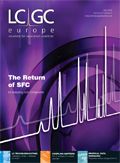Event News
Chromatographic Society Spring Symposium
Chromatographic Society Spring Symposium
Since celebrating its Golden Jubilee in 2006, the Chromatographic Society has continued with its core activity of organizing short UK symposia to promote the development of separation science. These one- or two-day symposia are normally held four times a year with the highlight being the annual Spring Symposium, which is held in tandem with the Society's Annual General Meeting and takes place this year at the Banqueting Suite of Sunderland AFC's Stadium of Light in the North East of England 13–14 May 2009.

As the Spring Symposium coincides with the Society's AGM it is always a priority to provide a programme with a wide range of topics so that it will be attractive to all members who might be coming along for the AGM. This year the chosen theme is Advances in LC–MS and Related Hyphenated Techniques, which highlights how much liquid chromatography (LC) is now inexorably intertwined with other fields and the extent that liquid chromatography mass spectrometry (LC–MS) has progressed. As well as catering for the Society's membership, it is hoped that more people from the MS community will get involved.
Advances in LC–MS Techniques and Related Hyphenated Techniques will not focus on LC–MS for drug bioanalysis as this will be extensively covered during the Reid International Bioanalytical Forum (July 6–9; see www.chromsoc.com).
The main themes are state-of-the-art, bioanalytical applications, industrial perspectives, gas chromatography mass spectrometry (GC–MS) and liquid chromatography nuclear magnetic resonance (LC–NMR) spectroscopy. Well-known UK authorities in the fields of LC–MS and hyphenation such as Ian Wilson, Frank Pullen and Colin Creaser will be giving their thoughts on the most recent developments. With respect to applications, the programme includes Professor Mario Thevis presenting on sports drug testing and Dr Karine Ndjoko describing how LC–NMR–MS may be put to excellent use in identifying bioactive natural products. Hubertus Irth will be describing the on-line production, testing, separation and identification of bioactive metabolites.
The Society is pleased to announce that Agilent Technologies is the Gold Sponsor of its Spring Symposium. Also sponsoring the meeting, presenting and exhibiting will be Thermo UK, Dionex UK, Waters UK, ACDLabs UK, Smiths detection USA and Waters Thar UK. Several Bronze Sponsors will also be exhibiting. Potential delegates should note that poster contributions to the meeting are most welcome.
Advances in LC–MS and Related Hyphenated Techniques is a wide-ranging event suitable for anyone with an interest in LC, MS or hyphenated techniques and promises to be another quality showcase for The Chromatographic Society.
Website: www.chromsoc.com
24 April 2009
"SFC for Pharmaceutical Analysis — Opportunity or Challenge?"
Robens Suite, Guy's Hospital Tower, London
Organizer: Royal Society of Chemistry Chromatography and Electrophoresis Group
Contact: Dr Melissa Hanna-Brown
Email: melissa.hanna-brown@pfizer.com
Website: www.rsc.org/ConferencesAndEvents
11–15 May 2009
ACHEMA 2009
Frankfurt am Main
Organizer: DECHEMA eV
Address: PO Box 15 01 04, 60061 Frankfurt am Main, Germany
Tel: +49 69 7564 0
Fax: +49 69 7564 201
Email: achema@dechema.de
Website: www.achema.de
22–23 July 2009
SFC 2009
Radisson Plaza-Warwick Hotel, Philadelphia
Organizer: Green Chemistry Group
Address: PO Box 169, Oakmont, Pennsylvania, 15139, USA
Tel: +1 412 805 6296
Fax: +1 412 967 9446
Email: info@greenchemistrygroup.org
Website: www.greenchemistrygroup.org
31 August–2 September 2009
The 9th International Conference Vitamins, Nutrition and Diagnostics
Mendel University of Agriculture and Forestry, Brno
Organizer: Radanal Ltd, Society for Nutrition, Prague and Tomas Bata University in Zlín
Address: Radanal Ltd. Okružní 613, 530 03 Pardubice, Czech Republic
Tel: +420 466 650 618
Fax: +420 466 651 171
E-mail: info@radanal.cz
Website: www.vitamins.cz
Send your event details to dkitson@advanstar.com
New TRC Facility Accelerates Innovation and Delivery
April 25th 2025We’ve expanded our capabilities with a state-of-the-art, 200,000 sq ft TRC facility in Toronto, completed in 2024 and staffed by over 100 PhD- and MSc-level scientists. This investment enables the development of more innovative compounds, a broader catalogue and custom offering, and streamlined operations for faster delivery. • Our extensive range of over 100,000 high-quality research chemicals—including APIs, metabolites, and impurities in both native and stable isotope-labelled forms—provides essential tools for uncovering molecular disease mechanisms and exploring new opportunities for therapeutic intervention.
New Guide: Characterising Impurity Standards – What Defines “Good Enough?”
April 25th 2025Impurity reference standards (IRSs) are essential for accurately identifying and quantifying impurities in pharmaceutical development and manufacturing. Yet, with limited regulatory guidance on how much characterisation is truly required for different applications, selecting the right standard can be challenging. To help, LGC has developed a new interactive multimedia guide, packed with expert insights to support your decision-making and give you greater confidence when choosing the right IRS for your specific needs.

.png&w=3840&q=75)

.png&w=3840&q=75)



.png&w=3840&q=75)



.png&w=3840&q=75)











